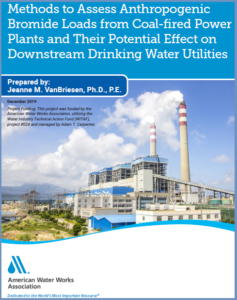AWWA Publishes Report on Bromide Impacts to Drinking Water from Coal-Fired Power Plants
 AWWA has published a report entitled, “Methods to Assess Anthropogenic Bromide Loads from Coal-fired Power Plants and Their Potential Effect on Downstream Drinking Water Utilities.” The report was developed with the help of EPA, ACWA, ASDWA, and a few states including the Pennsylvania and North Carolina state drinking water programs.
AWWA has published a report entitled, “Methods to Assess Anthropogenic Bromide Loads from Coal-fired Power Plants and Their Potential Effect on Downstream Drinking Water Utilities.” The report was developed with the help of EPA, ACWA, ASDWA, and a few states including the Pennsylvania and North Carolina state drinking water programs.
The purpose of the report is to provide information for states and water utilities to consider and address bromide impacts from coal-fired power plants using wet flue-gas desulfurization (FGD) air scrubbers. The report provides:
- Detailed information on how to identify and assess power plants that may be discharging bromide upstream of drinking water utilities and how to evaluate the potential treatment and public health impacts from disinfection by-product formation and its associated risks.
- Technical guidance for Clean Water Act regulatory agencies and National Pollutant Discharge Elimination System (NPDES) permit writers on approaches to limit bromide loads in drinking water supplies to help mitigate drinking water treatment challenges.
To download and read the report, visit AWWA’s website.

